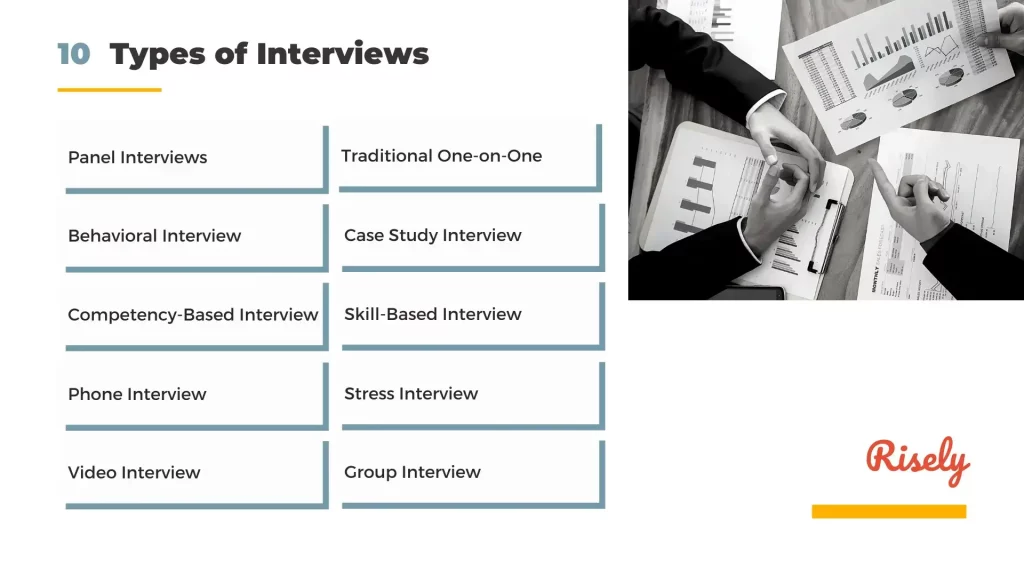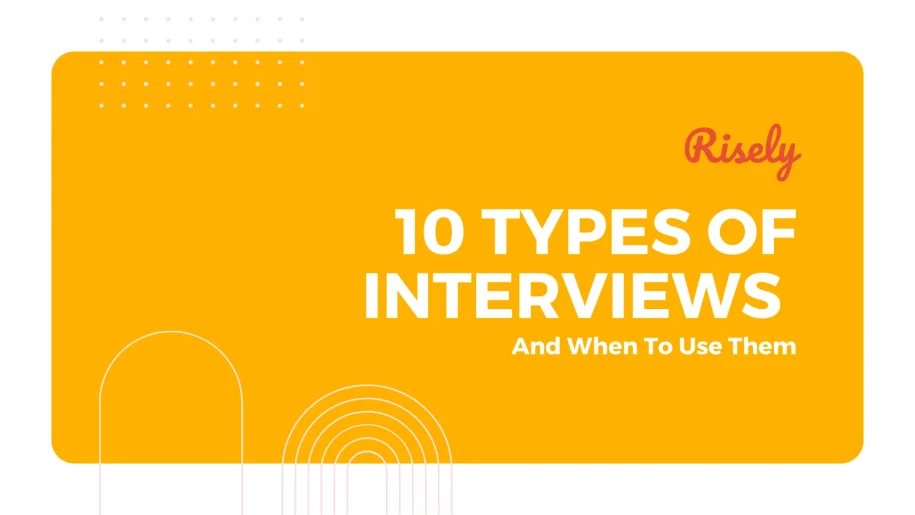10 Types of Interviews Every Hiring Manager Should Know
Interviews are a crucial part of the job search process, as they provide an opportunity for hiring managers to assess potential candidates’ qualifications, skills, and fit. As a hiring manager, it is important to be familiar with the different types of interviews and how to use them effectively to make informed hiring decisions for your team. The interview process can vary depending on the job role, industry, and organization. You should be aware of various types of interviews, each serving a different purpose and assessing different skills and qualities. Each type of interview provides unique insights into a candidate’s abilities, such as communication skills, problem-solving capabilities, leadership potential, and adaptability.10 Types Of Interviews And When To Use Them

Traditional One-on-One Interview
The traditional one-on-one interview is the most common type of interview. It involves a personal conversation between the interviewer and the interviewee. This interview allows you to get an in-depth assessment of the candidate’s qualifications, skills, and fit for the job. You can ask specific questions tailored to the candidate’s background and experience, allowing for a comprehensive evaluation. This type of interview provides an opportunity for a more personal connection between the interviewer and the interviewee, allowing for a deeper understanding of the candidate’s strengths and potential fit within the organization.When should you use traditional one-on-one interviews?
- When a detailed and comprehensive evaluation of a candidate’s qualifications, skills, and experiences is necessary.
- When you want to establish a rapport with the candidate to understand their personality, motivations, and cultural fit within the organization.
- When you have to discuss sensitive topics such as salary expectations, reasons for leaving previous positions, or personal challenges.
Panel Interview
In a panel interview, the candidate is interviewed by a group of interviewers who typically represent different departments or roles within the organization. This type of interview allows for a comprehensive evaluation of the candidate’s qualifications, skills, and fit for the job. The panel interview provides diverse perspectives on the candidate’s suitability and allows for a more comprehensive assessment. It also provides you an opportunity to evaluate the candidate’s ability to interact with different stakeholders within the organization.When should you use it?
- When the role involves significant interaction and collaboration with multiple departments or teams.
- When you require a diverse set of skills and expertise. A panel interview allows interviewers with different specialties to probe into various areas of the candidate’s knowledge and experience.
- When determining how well the candidate will fit within the existing dynamics of your team.
- To reduce individual workplace bias by incorporating multiple perspectives.
Behavioral Interview
Behavioral interviews focus on past experiences and how candidates have handled specific situations. This type of interview aims to assess a candidate’s problem-solving abilities, critical thinking skills, and decision-making capabilities. You can ask questions that prompt candidates to provide specific examples of how they have addressed challenges or demonstrated certain skills in their previous roles. By evaluating candidates based on their past behavior, hiring managers can make predictions about their future performance.When should you use behavioral interviews?
- When the position involves frequent problem-solving and critical thinking. Behavioral interviews can reveal how candidates approach and resolve complex issues.
- To predict how a candidate will perform in the future based on their past behavior. This method is grounded in the principle that past behavior is the best predictor of future behavior.
- When it’s necessary to understand how candidates have responded to specific situations relevant to the job.
- When cultural fit in hiring is a priority for you. Behavioral questions uncover whether a candidate’s values, work style, and behavior align with the organization’s culture.
Competency-Based Interview
Competency-based interviews focus on assessing the candidate’s competencies and skills specifically required for the job role. The interview questions are structured around the job description and aim to evaluate the candidate’s technical skills, knowledge, and expertise. The interviewer asks questions that directly relate to the key competencies required for the role, allowing for a targeted assessment.When should you use a competency-based interview?
- When the role requires specific technical skills and expertise.
- For roles where the candidate needs to be immediately productive.
- When you are hiring for high-stakes positions with minimal margin for error, such as senior management, critical project roles, or positions with high responsibility.
Group Interview
A group interview involves multiple candidates being interviewed concurrently. This type of interview allows you to observe the candidate’s interpersonal skills, teamwork abilities, and leadership potential. Group interviews are particularly effective for roles that require strong teamwork and leadership skills. They provide valuable insights into how candidates perform in a group setting and their ability to work effectively with others. Group interviews also efficiently assess multiple candidates simultaneously and compare their performance in a group setting.When should you use group interviews?
- When identifying candidates with leadership potential. Group interviews can reveal how individuals naturally take on leadership roles or influence the group.
- For roles that require collaborative problem-solving. Group interviews can include activities that require teamwork to solve a problem, showcasing each candidate’s approach.
- When you want to efficiently evaluate multiple candidates at once, allowing for direct comparison of their performance in identical situations.
Phone Interview
A phone interview is an initial screening method often used to narrow down a large pool of applicants. You can conduct this over the phone to verify a candidate’s interest and basic qualifications for the role. Phone interviews are particularly useful when you are hiring for remote positions, preliminary candidate assessment, or when an in-person interview is not possible. This type of interview allows you to evaluate the candidate’s communication skills, professionalism, and ability to articulate their thoughts and experiences over the phone.When should you use phone interviews?
- When you have a large number of applicants, phone interviews help quickly narrow down the list to the most qualified candidates.
- For remote or telecommuting positions, phone interviews provide a relevant context for evaluating how candidates handle non-face-to-face communication.
- To identify and eliminate candidates who do not meet the essential criteria early in the process, ensuring that only the most promising candidates advance.
Other Interesting Reads
Video Interview
A video interview is conducted via video conferencing, allowing face-to-face interaction between you and the candidate without physical presence. Video interviews are primarily used when geographic locations differ or for preliminary screenings. This format is beneficial for assessing visual cues, non-verbal communication, and the overall presence of the candidate. It offers a balance between personal interaction and the convenience of technology.When should you use video interviews?
- When candidates are located in different geographic regions, in-person interviews are not feasible. It can also help you save time and reduce travel expenses for the candidate and the interviewer.
- For preliminary screenings, narrow down a large pool of candidates with a more personal interaction than a phone interview.
- You can also use them for remote or hybrid positions to assess the candidate’s comfort and effectiveness in a virtual setting.
Case Study Interview
A case study interview presents candidates with a business problem, challenge, or scenario and requires them to problem-solve, strategize, and showcase their analytical skills. This type of interview is commonly used for roles that necessitate strategic thinking and creativity, such as consulting or managerial positions. The candidate is usually given limited information and is expected to analyze the situation, identify potential solutions, and present their recommendations. Case study interviews assess candidates’ ability to analyze complex data, think critically, and derive sensible solutions in real-time.When is a case study interview good to use?
- It is most commonly used in consulting roles where problem-solving as a leader and strategic recommendations are core aspects of the job.
- When it is important to gauge the candidate’s industry-specific knowledge and how they apply it to solve industry-related problems, along with decision-making and problem-solving processes.
- You can use it to provide a realistic simulation of the types of problems the candidate would face in the role, giving both the candidate and the hiring manager a clear idea of job fit.
Task-Oriented or Skill-Based Interview
A task-oriented or skill-based interview assesses the candidate’s abilities and competence by assigning them a specific task or set of questions. This type of interview allows you to evaluate the candidate’s practical skills and knowledge related to the job role. The task or questions can be tailored to the specific requirements of the role and can vary in complexity. This interview provides a more hands-on evaluation of the candidate’s abilities and offers valuable insights into their potential fit for the job role. You can include short tests, coding challenges, or sets of questions designed to assess the candidate’s technical proficiency and problem-solving skills.When should you use task-oriented interviews?
- For positions that require specific technical skills, such as software development, engineering, or data analysis.
- For roles where candidates need to demonstrate practical skills, such as design, writing, or customer service.
- To assess not only technical competence but also how well the candidate’s work style and approach align with your company culture.
Stress Interview
A stress interview is designed to assess a candidate’s composure and problem-solving abilities under pressure. You can use challenging, rapid-fire questions, unexpected interruptions, or simulations of complex scenarios to unnerve the candidate. The interview aims to assess how candidates perform under difficult conditions, evaluate their ability to think quickly and provide effective solutions. Stress interviews also determine the candidate’s ability to handle pressure, adapt to unexpected situations, and maintain professionalism.When should you use stress interviews?
- For roles where the ability to handle rejection, objections, and high-pressure situations is essential.
- In industries with rapid changes, tight deadlines, or high levels of competition, where employees must perform under constant pressure.
- Stress interviews can reveal candidates’ authentic reactions and behaviors, going beyond rehearsed or scripted responses.
How Can You Optimize the Interview Process?
When you are hiring, it is important to consider the specific requirements of the job role and select the appropriate interview style that aligns with those requirements. By conducting an efficient and targeted interview process, you can save time and resources and ensure that the right candidates are selected for further evaluation.Tailoring the Interview Type to the Job Role
Tailoring the interview type to the job role is essential to ensure that the hiring process effectively assesses candidates and determines the right fit. Different job roles require different skills and qualifications, and selecting the appropriate interview type that aligns with those requirements is important. For example, a competency-based interview that focuses on technical skills and knowledge may be more suitable for a technical role. On the other hand, for a role that requires strong interpersonal skills and teamwork, you should go for a group interview or a behavioral interview. Find more help: Mastering the Art of Hiring: A Comprehensive Hiring Manager Interview GuideCombining Interview Types for Comprehensive Assessment
When it comes to hiring the right candidate, a comprehensive assessment is crucial. By combining different types of interviews, you can better understand a candidate’s skills, personality, and fit within the company culture.For example, a combination of structured and unstructured interviews balances standardized evaluation and personalized exploration. Structured interviews provide a consistent framework for assessing specific skills and qualifications, while unstructured interviews offer insights into a candidate’s thought process, creativity, and adaptability. Read more: Top 10 Ways HR Can Contribute To Business Growth
Conclusion
In conclusion, you must understand the various types of interviews and how to use them effectively. Each interview type is specific in evaluating candidates and determining the best fit for the job. By tailoring the interview process to match the position’s requirements and combining different interview formats for a comprehensive evaluation, hiring managers can make informed decisions and select the most suitable candidates.Are you listening well? Check for free now.
Master the art of active listening by reviewing your skills with a free assessment now.
Other Related Blogs
Performance Management Training: Empowering Managers To Manage Better
Performance Management Training: Empowering Managers To Manage Better Remember that feeling of dread when you knew performance review season was rolling around? Yeah, us, too. For many employees, performance reviews…
Leaders Who Don’t Listen Often Fail. Here’s 5 Reasons Why
Leaders Who Don’t Listen Often Fail. Here’s 5 Reasons Why Leadership is a complex and dynamic role that requires a diverse set of skills and qualities. While many attributes contribute…
Grooming for Management: The Key to Building a Sustainable Leadership Pipeline
Grooming for Management: The Key to Building a Sustainable Leadership Pipeline Imagine a crucial leadership position opening up in your organization. You scramble to fill the role, internally and externally,…
Confused by L&D Metrics? Here’s How to Focus on What Matters
Confused by L&D Metrics? Here’s How to Focus on What Matters You’ve undoubtedly witnessed companies celebrating a record number of employees completing leadership training programs. Champagne toasts erupt, press releases…


